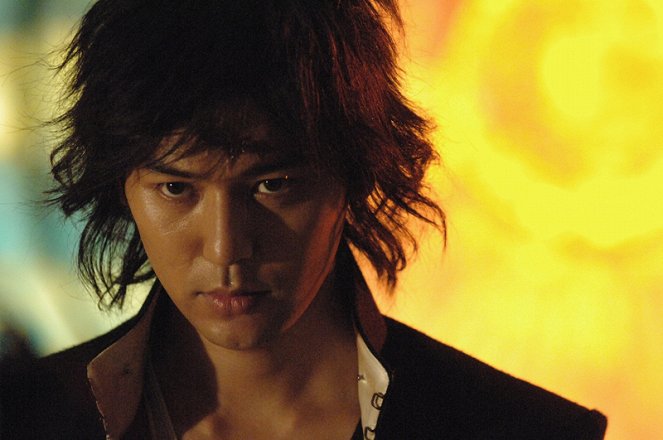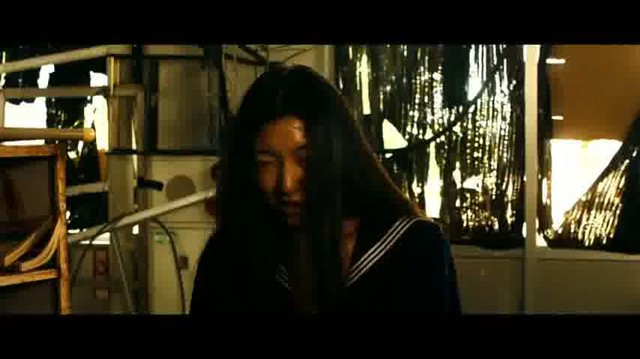Directed by:
Takashi MiikeScreenplay:
Takayuki TakumaCinematography:
北信康Composer:
小林武史Cast:
Satoshi Tsumabuki, Emi Takei, Tsuyoshi Ihara, Takumi Saitoh, 大野いと, Ken Aoki, 加藤清史郎, Ayano, 渡邉紘平, 市村正親, パパイヤ鈴木, 前田健, 河村春花, Toru Baba, 粟島瑞丸, Takahiro Kuroishi (more)Plots(1)
1972, Tokyo. Ai (Takei Emi) is a naïve rich girl who meets young street punk Makoto (Tsumabuki Satoshi) in the seedy Kabuki-cho district. Ai immediately remembers Makoto as the boy who saved her 11 years ago and falls head over heels in love with him. Using her parents' connection, Ai manages to get Makoto transferred into her fancy private school. However, Makoto gets into a fight with the school's teachers and gets kicked out of the academy. Completely devoted to the love of her life, Ai gives up her life of privilege and follows Makoto to a high school filled with delinquents, only to be challenged by new rivals for Makoto's affections. Will Ai's beautiful, angelic love save Makoto, or will she be swallowed by his dark world of crime? (Third Window Films)
(more)Videos (3)
Reviews (2)
In order to accept Ai to Makoto, it is necessary to realise that it is an adaptation of shonen manga that come out in the period from 1973 to 1976. As a story for boys, the promised grand romance is conspicuously set aside in favour of more straightforward attractions that appeal to the target audience, dispensing with long romantic gazes – in this case, space is thus mainly giving to brawls between high-school gangs. The time of the source work’s creation is made apparent in the narrative through overarching machismo and chauvinism, which, however, Miike a co. refreshingly subvert. Similarly as in 1970s exploitation movies (from which the original Ai to Makoto took certain elements – primarily the all-girl gangs), here the female characters are basically divided into two groups: cheeky self-confident girls who need a thrashing and mice who endlessly sacrifice for their men. The filmmakers made a brilliant decision when, as a means of adapting a story that’s insensible by today’s standards, they didn’t choose to update the setting to the present or to make it explicitly retro. The form of a flashy musical set in the 1970s makes it possible for the film to retain all of the elements of the source work, portray them with exaggeration and, thanks to the imaginative staging of the anachronistically macho story, turn them into a captivating spectacle. Thanks to certain passages (the theatrically conceived life story of one of the supporting characters, the nonsensical reflection of the actors’ ages contrasting with the supposed ages of the characters) Ai to Makoto is one of Miike’s more creative and more imaginative films from his period of major mainstream projects for the top studios and television companies. Following the hyper-serious Crows Zero II, this film offers a fresh sense of humour and even needed ridicule of the overwrought fight spectacles that are slowly becoming the equivalent of classic samurai movies, as they also provide a purely masculine and strongly ideological viewing experience that reinforces the contemporary macho ideals and where there is no place for women outside of their traditionally defined roles. In that respect, this film’s extraordinarily annoying and unlikable heroine, who is a caricature of certain twisted virtues, typically reflects the absurdity present at the core of not only 1970s trash flicks, but also in a substantial part of contemporary shonen manga/anime, whose aggressive sexism helps men to vent their frustration arising from women’s emancipation.
()
I didn't quite believe that Takashi Miike could pull off a musical, but he managed it flawlessly. But I didn't like the story itself. Yes, it's quite good to throw in a bit of action into a rather romantic drama; here it just looks good, but this time the form didn't save it as much. But I had a great time at some points.
()
Gallery (10)
Photo © Toei Company



Ads